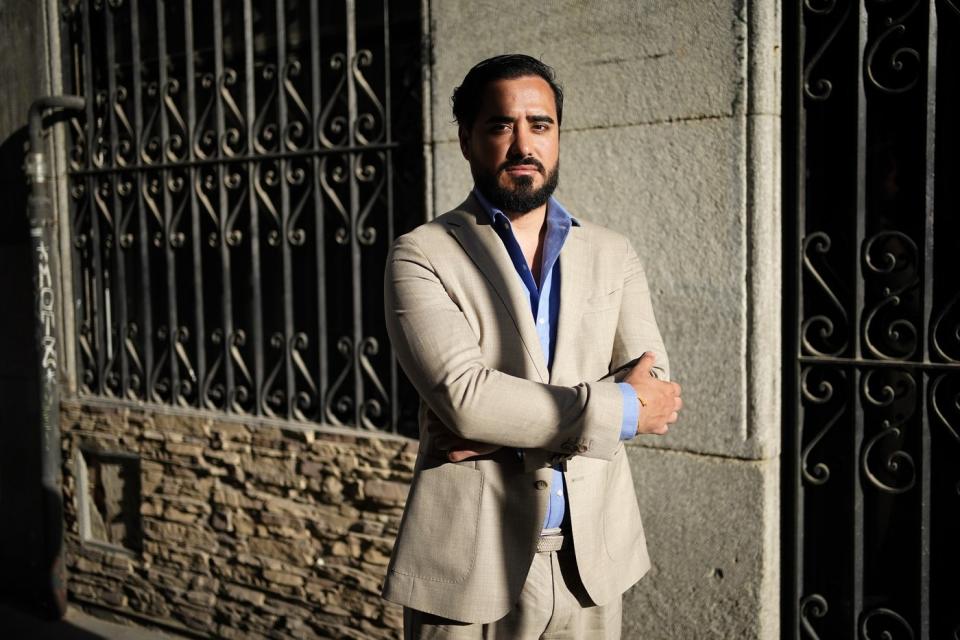2 political outliers claim seats in European Parliament by leveraging social media's viral power
NICOSIA, Cyprus (AP) — One is a wildly popular, seemingly happy-go-lucky YouTuber from Cyprus. The other is a brash, fringe figure of Spain's far right who rails against unauthorized immigrants. They both are new members of the European Parliament thanks to their savvy use of video-based social media.
YouTuber and TikToker Fidias Panayiotou is a 24-year-old with no political experience and no formal higher education who rode the wave of his online popularity — and public anger at the country's political elites — all the way to one of six seats allotted to Cyprus in the European Parliament.
He says he’ll keep using social media “as my biggest weapon to use” when he formally takes up his new job as a legislator in Brussels and Strasbourg, France.
Widely addressed by his first name, Fidias secured a remarkable one in five votes cast in Sunday’s election without the support of any political party — until now, thought to be the be-all and end-all of getting elected in any political contest in Cyprus.
Fidias sent shockwaves through the Cypriot political system by running a campaign in which he took no political positions, made no promises or even presented a program for his time in office.
“It seems now that people are hungry not for political positions, but for true people that are not lying (but) saying the truth,” he told The Associated Press in an interview in English, the language he uses for most of his posts.
Riding the wave
While Fidias avoided strong political positions and was already widely known for his online high jinks, Spaniard Alvise Pérez was mostly unknown until he leveraged his diatribes on Instagram and Telegram against the alleged dangers of immigration. He also railed against claims of widespread corruption among politicians to score not one, but three of the 61 seats Spain gets in the European Parliament.
The common factor between the Alvise and Fidias is that both hit the bullseye thanks to their mastery of social media to garner support among young people, many of whom may have been indifferent to politics.
“This is not just a Spanish phenomenon or only about a YouTuber in Cyprus,” Steven Forti, a professor of history at Barcelona’s Autonomous University and expert on the far right, told the AP.
Forti said the creation of “digital subcultures” around unorthodox candidates had been critical to the rise of Donald Trump in the United States and, more recently, Javier Milei in Argentina, as well as far-right figures across Europe. But this dynamic has been turbocharged by the increasingly video-based trends in social media.
“The newer types of digital platforms like TikTok and Instagram have clearly accelerated” the fragmentation of politics, Forti said, because they help the far right achieve its two main objectives of disseminating their ideas very quickly and making themselves appear as everyday, normal people.
Provocative fun
Fidias has spent the last five years boosting his popularity with outrageous video posts of him spending wads of cash in Vietnam, living a week in an airport for free, and burying himself alive for 10 days.
With over 5 million followers across all social media platforms, according to Fidias, that online footprint served him well when he decided to throw his hat into the election ring. He said he learned to play the social media game through trial and error and to understand what makes videos go “viral” online.
“At first I didn’t like what I saw in politics. So if you don’t like what you see, I think you need to become the change that you want to see,” said Fidias.
By his own admission, his online popularity only gave a segment of Cypriot voters — who are deeply disenchanted with the perceived corruption of a party system that has operated on a favors-for-votes basis for decades — an outlet to vent their anger and chastise the country’s political caste.
“It will be a lie to say that it was only the social media. I think it played the biggest factor, but it was a magnifying glass to what I really am,” he said.
Nicholas Papadopoulos, leader of the centrist Democratic Party, which lost its lone European Parliament seat, told Cypriot state radio on Tuesday that the vote clearly sent a “message of disappointment, of protest, of desperation, of anger” that targeted the country’s entire political system.
Political analyst Haridimos Tsoukas echoed Papadopoulos, saying one in five Cypriot voters wanted to make their point by sticking “their tongue out to the political system, not just in protest, but to express disgust in an ostentatious way.”
The Party Is Over
Alvise, which is a pen name, also successfully tapped into an irreverent vibe. He ran under the name “The Party Is Over” (“Se acabó la fiesta”) and with a logo of a cartoon squirrel wearing a Guy Fawkes mask that has long become associated with various so-called anti-system movements. Fawkes was an Englishman who tried to bomb the British Parliament on Nov. 5, 1605.
Forti said Alvise, like Milei, wanted to connect young people by projecting an image of being equal parts entertaining and rebellious. But he warns that the fun veneer is designed to deliver a hard-line message.
Alvise declares himself an admirer of El Salvador President Nayib Bukele and says he would like to build a mega-prison like the one the central American leader is raising. Many of his posts are honed to fan fears about immigration, even when the country’s economic authorities say more foreign workers are needed to prop up the public pension system.
“A field full of tomatoes now needs more paperwork to leave the farm than an illegal immigrant needs to enter the country,” Alvise told a hooting crowd after “The Party Is Over” won over 4% of the ballots cast in Spain and pulled in 800,000 votes.
Alvise has shocked Spain’s far-right Vox party, which earned six seats in the election but it would have likely done much better if Alvise had not launched his rogue venture.
Direct democracy?
While Alvise's rhetoric points to a drift toward illiberal rule, Fidias sees his unexpected triumph as democracy turning a corner toward a more direct connection between between voters and those they elect. He said social media empowers citizens by giving them a real, direct voice, “not just to follow what the TV says.”
“They can comment on the video, they can share it, they can make a video and respond to it. So it’s kind of a more direct democracy," he said about his modus operandi.
___
Wilson reported from Barcelona, Spain.
Menelaos Hadjicostis And Joseph Wilson, The Associated Press

 Yahoo Finance
Yahoo Finance 


